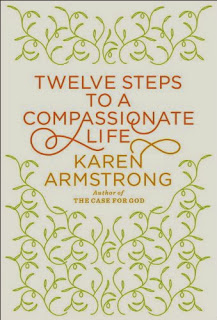Upon learning about the Charter for Compassion, I was determined to secure Karen Armstrong’s book, “Twelve Steps to a Compassionate Life,” for my small church lending library. Its emphasis upon the Golden Rule made it a valuable resource for nearly every religious faith and local interest in a Lake County charter gave it special timeliness and relevance.
Armstrong, a religious scholar, is author of many books including “A History of God: The 4,000-Year Quest of Judaism, Christianity and Islam” and “The Case for God.”
In “Twelve Steps to a Compassionate Life,” Armstrong relates how she asked the nonprofit group Technology, Entertainment, Design (TED) to help her create a Charter for Compassion that would be written by leading thinkers from a variety of faiths:
“In a world in which small groups will increasingly have powers of destruction hitherto confined to the nation-state, it has become imperative to apply the Golden Rule globally, ensuring that all peoples are treated as we would wish to be treated ourselves. If our religious and ethical traditions fail to address this challenge, they will fail the test of our time.”TED is perhaps best known for its conferences and speakers’ presentations that can be viewed online at www.ted.com/ but as Armstrong explains, TED presents a $100,000 award to people to help them make a better world. In 2007, Armstrong was the recipient of this award and the Charter for Compassion was the result:
“Thousands of people from all over the world contributed to a draft charter on a multilingual website in Hebrew, Arabic, Urdu, Spanish, and English; their comments were presented to the Council of Conscience, a group of notable individuals from six faith traditions (Judaism, Christianity, Islam, Hinduism, Buddhism, and Confucianism) who met in Switzerland in February 2009 to compose the final version.”The charter was officially launched Nov. 12, 2009.
In Lake County, local efforts culminated with the Lake County Board of Supervisors’ adoption on March 22 of a Lake County Charter for Compassion. It echos the language in the original charter: that “The principle of compassion lies at the heart of all religious, ethical and spiritual traditions, calling us always to treat all others as we wish to be treated ourselves.”
Having observed, far too often, people resorting to meanspiritedness — whether via online forums or during public testimony — I was thrilled that Lake County is part of the movement to restore compassion and respect to how people treat each other.
Hence the importance of Armstrong’s book. Like the title suggests, Armstrong presents a 12-step program for cultivating and expanding compassion.
A person doesn’t have to consider him- or herself “religious” to benefit from this book; treating other people as we wish to be treated can have secular value too by making interactions more productive.
“Twelve Steps to A Compassionate Life” is available in print and in audio format through the Lake County Public Library. Access the library catalog online or through a local branch to add your hold request.
For more information about the international charter, visit http://charterforcompassion.org/site/. For more information about the Lake County charter, visit http://lakecountycompassion.blogspot.com/.
Published May 3, 2011 in the Lake County Record-Bee

No comments:
Post a Comment
Robust debate and even unusual opinions are encouraged, but please stay on-topic and be respectful. Comments are subject to review for personal attacks or insults, discriminatory statements, hyperlinks not directly related to the discussion and commercial spam.